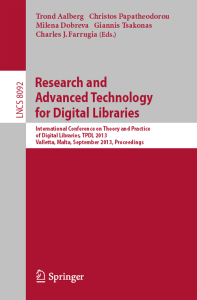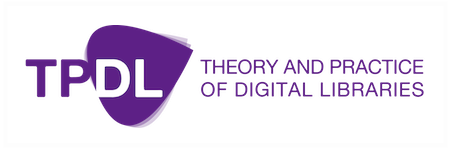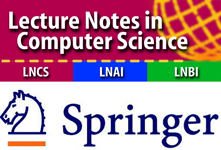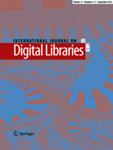General Chair(s) and the Organizing Committee
In each conference, the General Chair(s), the Program Chair(s), and any other explicitly identified chairs (for example, Tutorial Chair, Panel Chair, etc.) form the Conference Organizing Committee for that conference and are in charge of the planning, running, and oversight of that conference to ensure that it meets the objectives of TPDL.
The Honorary Chair of the ECDL/TPDL conferences Dr. Ing. Constantino Thanos is a permanent member of the Organizing Committee of each conference and participates to them with waived fees.
The General Chair(s) are responsible for the overall running of the conference and serve as the Chair(s) of the Organizing Committee. They will prepare a report of the scientific results and the expected financial results of the conference, to be presented at the yearly meeting of the Steering Committee being held in connection with that conference.
The Organizing Committee approves all major decisions concerning the conference. The General Chair(s) are responsible for the finances of the conference and for coordinating local arrangements. To these ends, the General Chair(s) will appoint a Treasurer and a Local Arrangements Chair. The General Chair(s) may also appoint a Publicity Chair, a Publication Chair and other positions as necessary.
As a general rule it is assumed that each conference will be a not-for-profit self-supporting event. It is the responsibility of the Organizing Committee to seek external funding (sponsors, specific programs at the national or European Commission level, contributions from scientific institutions, etc) in order to keep the registration fee as low as possible. If the final balance of a conference budget will be positive, it is recommended to use the surplus money to fund the participation of young researchers to TPDL conferences, or to other scientific events related to Digital Libraries. The participation of invited speakers, panelists, tutorialists, etc should not normally be paid, except for the waiving of the registration fee and, possibly, the reimbursement of travel expenses.
The General Chair(s) and the appointed Publicity Chair are responsible for the publicity of the conference. All notices requesting papers, panels, tutorials and tool demonstrations, as well as the advance program announcement and registration material, shall be widely distributed in a timely manner. This should include announcements in professional and research journals, electronic bulletin boards, the Web and mailings to individuals on (electronic and postal) mailing lists of interested or participating organizations.
Program Chair(s) and the Program Committee
The Program Chair(s) are responsible for planning and implementing the technical program of the conference, and therefore their main responsibility is to ensure that the scientific quality of the conference be at the highest possible level.
Program Committee
The Program Chair(s) will appoint individuals to serve on the Program Committee (with the advice and consent of the General Chair(s)). Program Committee members shall be chosen on the basis of their scientific and technical qualifications and experience. The Program Committee should be diversified in terms of expertise and representation, including members from the technology domains and members from the user communities. The Program Committee should also be diversified in terms of geographical distribution, with the total number of members from any one country not exceeding one fifth of the total number. The program Chair(s) should promote continuity by keeping some committee members from the previous conferences (e.g., members from past Organizing and Program Committees).
It is expected that Program Committee members will attend the program committee meeting(s) at which acceptance or rejection decisions are made. At the discretion of the Program Committee Chair(s) and the General Chair(s) these meetings may be conducted via virtual meeting rooms (video conference) or even via telephone or electronic mail.
Call for Papers
The Program Chair(s) will prepare the Call for Papers (together with the Publicity Chair), send out notification of acceptance or rejection of submitted papers, and send out instructions to authors for submitting their final papers. The call for papers as well as actions by the individuals on the Program Committee shall encourage the submission of high quality papers that have not been previously published or are currently submitted elsewhere.
Reviews of Submitted Papers
The Program Committee shall be responsible for reviewing all submitted papers, for submitting timely, informative reviews that provide authors with feedback about their papers, and for attending Program Committee meetings. The Program Chair(s) will determine the procedures for reviewing and accepting papers for the program. They shall distribute the papers for review and arrange information so the papers can be discussed by knowledgeable reviewers during the program committee meeting. Program Committee members can seek expert advice from external reviewers, but they shall be responsible for having reviewed the papers themselves.
Each paper shall be reviewed by at least three reviewers and each paper shall be discussed at the program committee meeting. If consensus cannot be formed or there are additional concerns raised about a paper, additional information or reviews should be obtained. If a committee member (Program, Organizing or Steering Committee) submits papers, care must be taken that her/his paper(s) be reviewed at least as stringently as other submitted papers. Committee members shall leave the room during the discussion of their submitted papers or for any paper where she/he might have a conflict of interest.
All discussion about a paper shall remain in confidence. The names of the reviewers are not to be revealed to the authors. Reviewers, however, shall be free to identify themselves to an author, if they so wish.
Proceedings
 Proceedings by the Springer’s Lecture Notes on Computer Science series in USB sticks or in other electronic mean will be offered to all participants. Extra proceedings or access to the proceedings through the Springer’s portal will be available at a reasonable price. This is the responsibility of the Program Chair(s), in cooperation with the General Chair(s) and eventually other persons from the conference organization.
Proceedings by the Springer’s Lecture Notes on Computer Science series in USB sticks or in other electronic mean will be offered to all participants. Extra proceedings or access to the proceedings through the Springer’s portal will be available at a reasonable price. This is the responsibility of the Program Chair(s), in cooperation with the General Chair(s) and eventually other persons from the conference organization.
Proceedings Title: Research and Advance Technology for Digital Libraries
Subtitle: XXth International Conference on Theory and Practice of Digital Libraries, TPDL YYYY
City, Country, Month, YYYY, Proceedings.
(XX stands for the number of the conference and YYYY for the Year (4 digits e.g. for TPDL 2013, XX had the value 17th ).
Constituting a Conference
The Steering Committee obtains, through open and informal solicitations, proposals for conference locations and names of individuals who are suitable to serve as General Chair(s) and Program Chair(s). Institutions or individuals interested to propose and organize a future TPDL conference should send written proposals to the Chair(s) of the Steering Committee at least 26 months before the proposed date.
The proposal shall list facilities, venue, proposed management, preliminary budget and financial arrangements, a brief summary of the conference structure, a draft of a preliminary call for papers, the scheduling of any other potentially conflicting digital library related event (within several months before and after the proposed conference date), and any other information that the proposers deem relevant to the evaluation of the proposal. The proposers should provide special fees for retired participants as well as for association members (e.g. ACM, IEEE, ASIST, etc.).
The Steering Committee reviews proposals (possibly with the assistance of external reviewers) and notifies the proposers of acceptance at least 20 months before the proposed date.
A TPDL conference aims to appeal to a broad digital library community. To that end proposals (and subsequent program implementation) should insure a broad range of contributions, from a broad representation of the digital library community. Research papers will be the primary type of contributions, but other types should also be included, such as invited talks, panels, posters, demonstrations, reports on systems, vendor displays. In addition, satellite events such as tutorials and workshops should be organized in connection of a TPDL conference, in order to better fulfil the objectives of TPDL. Tutorials should address young researchers in the field of digital libraries, to promote the knowledge of advanced and emerging technologies, or they should address user communities, to disseminate the use of advanced tools. Workshops should be a forum for discussions and exchange of ideas on relevant new topics, and they should include both the researchers and the user communities.



